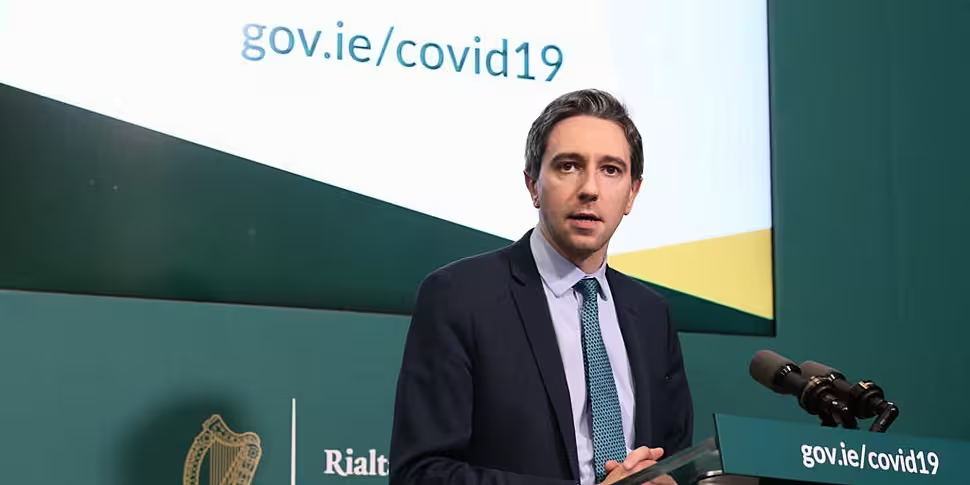Health Minister Simon Harris has said the Government is keeping "an open mind" on whether to change the law over face masks.
At the moment, the health advice is to wear a mask or covering on public transport or in spaces where social distancing may not be possible.
However it is not mandatory.
Minister Harris told Newstalk Breakfast: "The evidence is relation to this has been changing and evolving.
"If you put a load of doctors in a room and ask them to debate face masks, you'll get lots of different opinions.
"There seems to be a broad consensus that in healthcare settings, there's a very significant benefit."
"Outside of healthcare settings you've been hearing lots of different views - my own view, and the view of public health experts, is that you should wear a face covering when you're on public transport or when you're in enclosed areas where you might accidentally not be able to social distance."
"We have an open mind on whether we need to change the law - my gut is we don't."
"So I think it's probably a public awareness piece".
But he added: "My absolute appeal to anybody getting on public transport or going into a shop today is to please wear a face covering.
"And I'd point out that the difference between a face covering and a face mask [is] you can make a face covering at home with just a t-shirt or socks."
"It provides protection awareness; it's an additional hygiene measure - it's not a magic shield, but there's definitely some benefit in doing it".
Regional approach
He also suggested that any future spike in new cases could be handled at a regional level.
He said: "I look at the county figures on a daily basis: I think in Co Sligo now we haven't seen a case in 22 days.
"So for longer than three weeks, we haven't see a new case of COVID in Sligo.
"There's other places like Mayo and Galway that we haven't seen cases for quite a number of days - Kerry I think, as well, for maybe over two weeks.
"So it is possible that we could take an approach whereby if there was a certain outbreak or cluster in a certain area or a certain workplace, or a certain part of society, that you could take measures in relation to that.
"We actually know now the different measures that you can take and the effects that they have on that R number in terms of reducing the prevalence of the virus."
"I'd hope that if you got to that point that you'd be able to take a more nuanced response, now that we know an awful lot more - and the laws that were passed do allow us take certain measures in certain geographic areas.
"Now I should say it's harder to do that in a smaller country than it is in a larger country like France or Germany".
"Cop on and common sense"
He is also appealing to people to use 'cop on and common sense' as Ireland moves into phase two of re-opening from COVID-19.
"I can understand the nervousness, Kieran, our country has been and continues to go through these very, very difficult times.
"This is a very dangerous virus - it's caused havoc, devastation and tragedy in our country, and across the world.
"But what I would say to all of your listeners is we're continuing to very closely follow public health advice.
"So remember it was the NPHET who wrote to me and advised that perhaps we could do our plan in four phases rather than five, that perhaps we could do some additional measures to help children, to help older people.
"Today wasn't always guaranteed - there are grannys and grandads waking up this morning thinking 'wow, I might be able to see my grandkids again - if not today by the end of month'.
"There are people waking up, getting out of the bed, heading back to work - not sure whether that job would ever come back.
"This is an incredible day for the Irish people - they've done it, they've gotten us to this point.
"What we all have to do now is we have to take precautions - we still need to keep our close contacts to a small number of core people that we need to see, that we want to see.
"And then obviously all of the normal rules about keeping our physical distance, washing our hands - they actually become more important and not less at this stage."
Mr Harris said he is "encouraged" that over the last three days there has been 30 or fewer new cases of the virus.
However he said: "But I think those close contact figures are an indication of how very quickly, if we don't act responsibly, the number of close contacts that each and every one of us has could shoot up.
"And that of course would be a risk - and that's why I'm appealing to people to use that cop on and common sense they have throughout this pandemic.
"Now is not the time to meet your second cousin, once removed - you might have missed your mom or your dad, your brother, your sister, you might want to have the next door neighbour in for a cup of tea - but let's keep our close contacts to a minimum".
He has also appealed to people who do meet up with others to jot down or keep a note in their phone of their close contacts, so they can let public health authorities know quickly if necessary.









